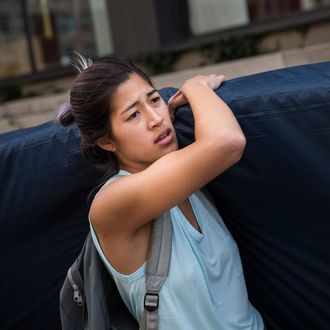
Paul Nungesser, the Columbia University student whom classmate Emma Sulkowicz claims raped her, has come forward with a more factually detailed denial of the allegations against him. In addition to offering his version of events on the night of the alleged rape, he provided a reporter for the Daily Beast with Facebook message transcripts that show warm interactions with Sulkowicz in the weeks and months after the incident.
Sulkowicz drew national attention — including a New York cover story — when, as an art project, she began carrying a mattress around campus to symbolize the alleged rape. When Nungesser spoke to the New York Times in December, the resulting story focused largely on the effects of having to endure a trial in the court of public opinion after the university cleared him of all charges. The Daily Beast story was reported by Cathy Young, a contrarian feminist.
Nungesser says that on the night of the alleged assault, in August 2012, he was not drunk — just buzzed — and he and Sulkowicz engaged in consensual anal sex (among other acts). In a message sent two days after the incident, Sulkowicz accepts Nungesser’s invitation to a party, adding: “Also I feel like we need to have some real time where we can talk about life and thingz” and “because we still haven’t really had a paul-emma chill sesh since summmmerrrr.”
In early October, Sulkowicz responds to a birthday greeting with, “I love you Paul. Where are you?!?!?!?!” — all part of a pattern of friendly behavior, according to Nungesser, who also says that when he was initially contacted by university administrators about a rape allegation, he thought it was as a witness in another sexual-assault case. The transcripts suggest that it wasn’t until early 2013 that Sulkowicz stopped responding to Nungesser’s messages. (Young’s story also casts doubt on allegations of sexual assault against Nungesser by two other Columbia women — both of which he denies.)
As many have pointed out, however, cordial or even friendly interactions with attackers don’t necessarily disprove claims of sexual assault. (Domestic-violence victims who stay with their attackers are a commonly used example.) Young addresses this concern with a parenthetical aside and notes that Sulkowicz initially offered to provide annotations for the message transcripts.
Sulkowicz, for her part, spoke to Mic about Young’s reporting:
“Normally I don’t respond to people who use my rapist as collateral in order to make me talk to them,” she told Mic. Then, last Tuesday night, Young emailed again, this time saying she had about six pages of Facebook conversations between Sulkowicz and Nungesser and wanted to confirm their accuracy before publishing.
“It’s an awful feeling where this reporter is digging through my personal life. At this point I didn’t realize that she’s extremely anti-feminist and would do this in order to shame me,” Sulkowicz said, noting that she feels Young has “written other articles supporting the rapists and making survivors look unreliable.”





























